
| KEY STAT | LEAGUE RANK | |
| Defensive one-on-one loss % | 29.5% | 14th |
| Uncontested possession differential | -19.9 | 16th |
| Centre bounce to inside 50 % | 67.0% | 14th |
SUMMARY
Given the club's young and developing backline, it stands to reason that opposition forwards are going to get the better of less experienced defenders from time to time. While the Crows certainly need to improve in their one-on-one defensive battles, natural progression would suggest they will. Adelaide's players clearly need to work harder on defence too; the players attack hard but when they turn the ball over their opponents often find themselves wide open. With Sam Jacobs' dominance, the Crows should be better at converting centre bounce wins into an inside 50. Midfielders take note! – Harry Thring

| KEY STAT | LEAGUE RANK | |
| Inside 50 differential | -9.9 | 16th |
| Score per inside 50 against | 50.5% | 18th |
| Points from intercepts | 35.6 | 18th |
SUMMARY
The ball went inside the Lions' defensive 50 often, and it resulted in scores at an alarming rate. Whether it's the ease of delivery or the young backline struggling to cope with the supply, conceding scores on more than 50 per cent of opposition entries is simply too high, and not surprisingly ranked last in the league. A fit Daniel Merrett for the entire season would help, and shuffle younger defenders like Justin Clarke, Darcy Gardiner and Harris Andrews on to lesser opponents. The Lions also ranked last in conceding points from intercepts, highlighting a weakness in their transition defence. – Michael Whiting
Despite a great year from Harris Andrews, the Lions leaked goals like a sieve in 2015. Picture: AFL Media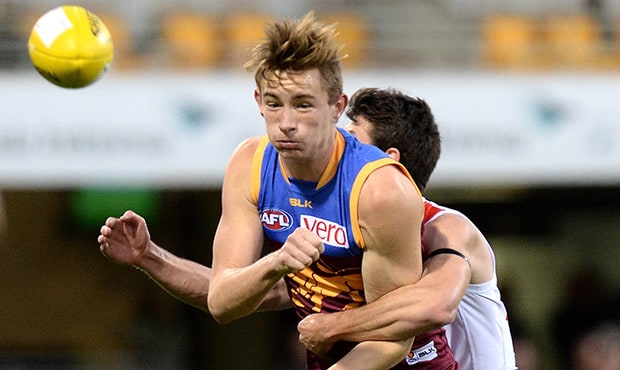

| KEY STAT | LEAGUE RANK | |
| Scores per inside 50 against | 49.8% | 17th |
| Tackles | 56.7 | 18th |
| Time in forward half | -7:51 | 17th |
SUMMARY
When you 'win' the wooden spoon, most stats will look damning. But the Blues' defence was as limp as a wet lettuce leaf at times last season and the numbers make for particularly ugly reading. Not only was the ball entrenched in Carlton's defensive half, but the Blues' tackling pressure on the ball carrier was the worst in the competition, and it's little surprise the under-siege backline leaked a score from one in every two of the opposition's inside 50s. The only way is up. – Travis King

| KEY STAT | LEAGUE RANK | |
| Kicking efficiency | 64.1% | 16th |
| Defensive 50 to score % | 8.1% | 16th |
| Centre bounce clearance differential | -2.6 | 18th |
SUMMARY
The Magpies lost six games by 12 points or fewer in 2015 and part of that can be attributed to their lack of efficiency with ball in hand late in close games. Coach Nathan Buckley told fans at a recent members forum that he wants his team to be the best transition side in the competition. Already this pre-season, Collingwood has had a significant emphasis on moving the ball swiftly, with precision, from defence. The continued development of young ruckmen Brodie Grundy and Jarrod Witts will balance out the fact the Magpies are last in the competition in the centre-bounce clearance differential category. – Ben Guthrie

| KEY STAT | LEAGUE RANK | |
| Scores per inside 50 entry | 41.8% | 18th |
| Points for | 71.8 | 15th |
| Clearance differential | -3.8 | 17th |
SUMMARY
Essendon's frustrating ball movement is evidenced by some of its statistics, with the Bombers the most wasteful of any club in the competition last year. The Bombers scored just 41.8 per cent of the time they entered the forward 50, the lowest rate of any team. The Bombers also managed just 71.8 points a game on average throughout 2015, which placed them in the bottom four in the league. The Bombers' injury woes in the midfield were also obvious in their clearance numbers, having the second-worst differential in the competition. The absence of Jobe Watson, David Myers and Heath Hocking for long periods and a struggling ruck division made for big difficulties at the stoppages. – Callum Twomey
The Dons suffered from a below-par David Zaharakis and an injured Heath Hocking. Picture: AFL Media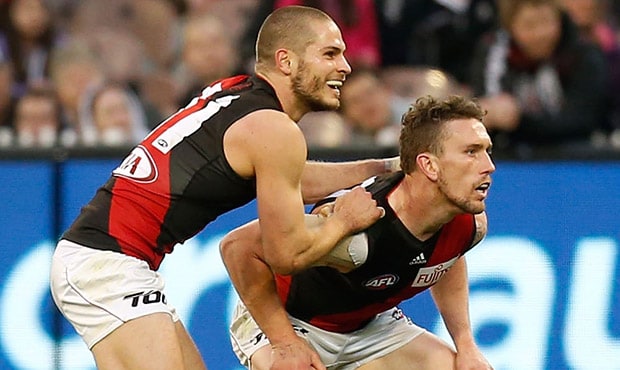

| KEY STAT | LEAGUE RANK | |
| Marks inside 50 | 10.5 | 13th |
| Rebound 50 to inside 50 | 19.5% | 14th |
| Points per fourth quarter | 19.0 | 14th |
SUMMARY
The Dockers were searching for ways to improve these areas throughout 2015. Ross Lyon trialed using three talls in the forward line to stretch opposition defences and create more marks, but the personnel rather than the structure was the issue. Matt Taberner has been working exceptionally hard on his one-on-one marking so far this pre-season. Nat Fyfe will almost certainly push forward more often next season with the presence of Harley Bennell. Transition from defence to attack is all about skill execution and decision-making. The Dockers worked hard at it last season and will continue to do so over the pre-season. Points per fourth quarter is a bit misleading as the Dockers' lowly ranking is more reflective of their early dominance in games rather than a lack of fitness in finishing games off. They tended to ease off the throttle and move into self-preservation mode after establishing big leads in 2015. – Alex Malcolm

| KEY STAT | LEAGUE RANK | |
| Score per inside 50 conceded | 47.5% | 14th |
| Clearance differential | -5.3 | 18th |
| Hit-out to advantage % | 26.9% | 16th |
SUMMARY
In 2015, Geelong was not the sturdy defensive unit that was a trademark of their style of play in recent seasons. Injuries to Jared Rivers and Andrew Mackie did not help with defensive cohesion, while Harry Taylor did not have the season many have come to expect from an All Australian-calibre backman. Geelong also had issues in the middle of the ground as the side's reliance on a battered Joel Selwood was exposed. Patrick Dangerfield's arrival should address that concern straight away. Injuries to Rhys Stanley and Mitch Clark also stunted the Cats' success in the ruck. Having Stanley and Nathan Vardy to call on, as well as the addition of Zac Smith, should help immensely. – Ben Guthrie

| KEY STAT | LEAGUE RANK | |
| Uncontested possession differential | -72.0 | 18th |
| Inside 50 differential | -12.0 | 18th |
| Marks per game | 76.2 | 18th |
SUMMARY
A lot of Gold Coast's problems are illustrated by its inability to prevent opponents racking up uncontested possessions. Ranking last with a differential of -72 a game in that category highlights a lack of discipline, a lack of fitness and/or a lack of willingness to run. The Suns were smashed by injuries last year and played a lot of younger guys together that arguably weren't ready for week-in, week-out football. They have a new fitness coach in Justin Cordy and with some of their more experienced and fitter players – like Gary Ablett, David Swallow and Dion Prestia – expected to play larger roles in 2016, this should be largely rectified and take pressure off a defensive unit that copped an inside 50 differential of -12 a game. – Michael Whiting
David Swallow was just one of the gun Suns to make up 2015's worst injury list. Picture: AFL Media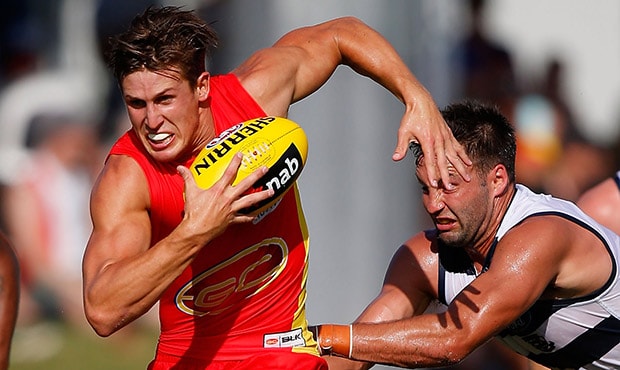

| KEY STAT | LEAGUE RANK | |
| Points from centre bounces | -4.6 | 17th |
| Contested possession differential | -6.0 | 14th |
| Score from centre bounces against | 26.3% | 16th |
SUMMARY
No surprises in these categories for the Giants with the man who is their barometer in the centre square – ruckman Shane Mumford – playing just 11 games last season. Without Mumford, who loves the contested ball once it hits the ground, GWS struggled to get any momentum from centre bounces in the second half of 2015. When Ryan Griffen went into defence mid-season, co-captain Callan Ward was the lone hard nut in at centre bounces, so many of GWS' attacks started from defence with running backs Heath Shaw, Griffen and Zac Williams. – Adam Curley

| KEY STAT | LEAGUE RANK | |
| Hitout to advantage % | 27.8% | 13th |
| Ground ball differential | -4.3 | 2nd |
SUMMARY
Such is Hawthorn's all-round brilliance, Champion Data only ranked the defending premiers 'bad' in two categories last season. Although the Hawks were rated a lowly 13th for hit-outs to advantage, it mattered little as their experienced on-ball brigade still ranked fifth in the AFL for clearances. Groundball differential appeared on most fans' radars for the first time early last season when the late Phil Walsh promised his Adelaide players that he would make them "jump off the jetty" if their performance in that area didn't improve. But the stat – combining loose and hard-ball gets – was clearly not as high on the Hawks' agenda, with little effect on their fortunes. – Travis King

| KEY STAT | LEAGUE RANK | |
| Uncontested possession in fwd half | 76.3 | 16th |
| Set shot accuracy | 58.5% | 16th |
| Clearance differential | -3.5 | 16th |
SUMMARY
Improving set shot accuracy would enable Melbourne to make huge inroads into its competitiveness. Whether players just need to kick straighter, or the team needs to become better at making the right decisions on whether to kick for goal or put a teammate in a better position is unclear, but it is a discrete activity they can work on. The gradual development of midfield depth and natural improvement from Max Gawn should improve the Demons' ability to win first possession while their ball movement remains a work in progress. – Peter Ryan
Jesse Hogan had an outstanding year but the Dees couldn't kick straight as a team. Picture: AFL Media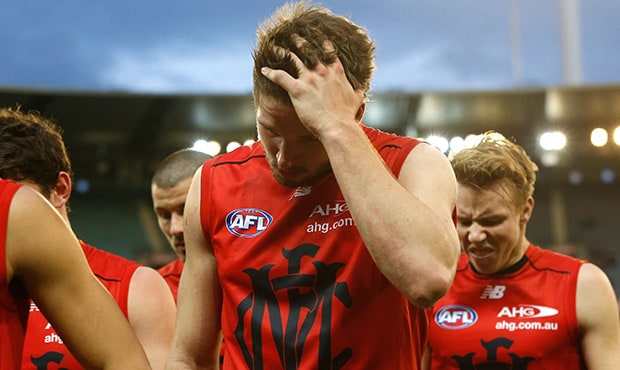

| KEY STAT | LEAGUE RANK | |
| Defensive 50 to inside 50 against | 22.9% | 13th |
| Set-shot accuracy | 59.4% | 13th |
| Defensive one-on-one loss | 32.7% | 18th |
SUMMARY
After reducing its average conceded score from 90.1 points a game in 2013 to 78.7 in 2014, North was easier to score against last season, conceding 88 points a game. The Roos' miserly 2014 season came at the expense of their offensive output – they scored 12.8 fewer points a game than in 2013 – but their defensive drop-off last season did not come with a compensatory scoring spike, as they scored just 1.6 points more a game compared to 2014. Coach Brad Scott will be keen to address the ease with which opponents moved the ball from defence into attack last season, with forward-50 and midfield pressure presumably big focus areas this pre-season. The Roos' defenders must also strive to at least halve more contests in 2016. Meanwhile, North's forwards need to sneak in as much goalkicking practice as they can this summer to ensure they improve their set-shot conversion in 2016. - Nick Bowen

| KEY STAT | LEAGUE RANK | |
| Clearance win % | 37.3% | 15th |
| Defensive mid to score % | 14.6% | 16th |
| Loose-ball get differential | -3.4% | 17th |
SUMMARY
The Power had plenty of issues in 2015 and a major point of trouble was their ruck department. The combination of Patrick Ryder and Matthew Lobbe didn't work as well as was hoped and consequently Port struggled to win clearance. Ollie Wines' injuries didn't help either. Turnovers have long been another problem for Ken Hinkley's men and, in a season where little went to plan, skill errors and then a lack of work rate saw opposition sides win plenty of loose possession, allowing opposition midfielders find themselves in scoring positions. – Harry Thring

| KEY STAT | LEAGUE RANK | |
| Tackle differential | -7.7 | 15th |
| Forward half stoppages | 33.0 | 16th |
| Hitout win % | 40.4% | 13th |
SUMMARY
After being ranked in the top five when it came to winning forward half stoppages in 2014, the Tigers fell away last season to plunge to 16th in the competition. Even though they had No.1 ruckman Ivan Maric for 22 games after his injury-hit previous year, they also won fewer than half the hit-outs they contested to be ranked 13th. While they maintained their presence as a consistent outfit when it came to winning contested possessions, their tackling was again ranked low within the League – 15th overall – which was still an improvement on 2014 when they were 17th. – Jennifer Phelan
The Tigers again failed to rank well as a high-pressure tackling team. Picture: AFL Media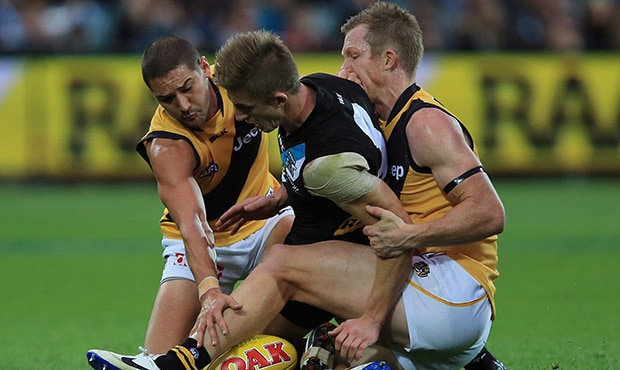

| KEY STAT | LEAGUE RANK | |
| Score per inside 50 against | 48.8% | 16th |
| Contested possession differential | -8.3 | 16th |
| Points against | 98.3 | 15th |
SUMMARY
The Saints had some brave wins but when the floodgates opened, things got messy. They had three losses by more than 63 points and an additional six by more than 35, which left them ranked 15th when it came to points scored against. The recruitment of Jake Carlisle to their backline should help to stem the flow when opposition teams get a run on next season. They also need to get better at making their forward entries count. While they played an exciting and aggressive brand of football at times, they scored fewer than half the times they took the ball inside 50. A strong pre-season will see Luke Dunstan add another dimension to their midfield after he was affected by shoulder soreness in 2015, helping to boost their contested possession output. – Jennifer Phelan

| KEY STAT | LEAGUE RANK | |
| Forward-half possession from kick-in | 22.6% | 14th |
| Forward-half kicking efficiency | 54.7% | 18th |
| Crumbing possessions (total) | -33 | 16th |
SUMMARY
The Swans' kicking efficiency let them down frequently in 2015 and it cost them games both coming out of defence and going inside 50. The side's backline is its most experienced area on the ground but errors by foot at crucial times haunted the Swans, so much so that recruiting manager Kinnear Beatson went to this year's NAB AFL Draft hunting players with quality foot skills. With Ben McGlynn (calf-hamstring) and Isaac Heeney (knee) missing several games, the Swans also lacked a crumbing forward who could feed off the likes of Lance Franklin and Kurt Tippett. – Adam Curley
The Swans went hunting for skilled youngsters to help Heath Grundy and co in defence. Picture: AFL Media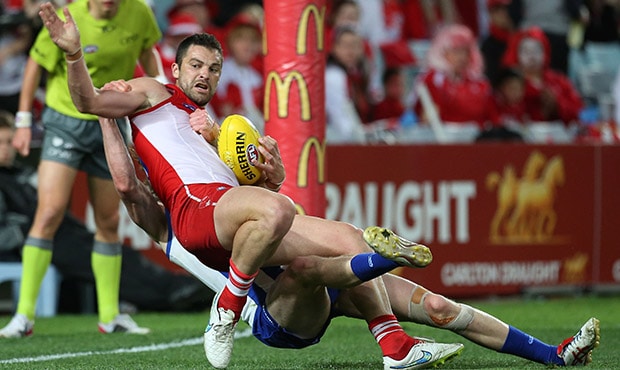

| KEY STAT | LEAGUE RANK | |
| Pre-clearance groundball differential | -2.4 | 16th |
| Centre bounce to inside 50 | 67.3% | 13th |
| Scoring accuracy | 57.5% | 12th |
SUMMARY
The pre-clearance groundball differential and centre bounce to inside 50 percentage stats won't worry the Eagles too much, given they are ranked second for contested possession differential and first in scoring from stoppages. But the scoring accuracy is a concern. Adam Simpson has been strong in defending his side's goalkicking accuracy and they do work exceptionally hard on it at training. But the numbers don't lie. They had some horror days in front of goal last year. They kicked 10.15 in horrible conditions in Hobart and lost to North Melbourne as a result. They kicked 10.20 in the preliminary final and then 8.13 in the Grand Final. Hawthorn was clearly the better side but the scoreboard read 9.3 to 3.9 at one point just after half-time. Had the Eagles taken their early chances the game could have been entirely different. More work and confidence are the only cures to goalkicking woes – Alex Malcolm

| KEY STAT | LEAGUE RANK | |
| Defensive one-on-one loss % | 32.0% | 16th |
| Hitout to advantage rate | 27.8% | 14th |
| Disposal efficiency against | 73.8% | 16th |
SUMMARY
The Bulldogs didn't really structure themselves to win defensive one-on-ones, relying on intercept marking and players going third-man-up to defend the high ball. They will improve in this area but it will take time. The Dogs' hitout-to-advantage rate also needs to be read in context, given the Bulldogs employed some unusual rucking plans throughout 2015. Making it harder for opponents to hit targets will remain a focus as pressure is a cornerstone of the Bulldogs' approach but under Luke Beveridge, the only statistical measure that indicates whether something works is the scoreboard. – Peter Ryan


